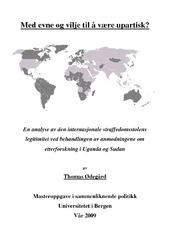| dc.contributor.author | Ødegård, Thomas | eng |
| dc.date.accessioned | 2010-09-10T10:04:13Z | |
| dc.date.available | 2010-09-10T10:04:13Z | |
| dc.date.issued | 2009-05-20 | eng |
| dc.date.submitted | 2009-05-20 | eng |
| dc.identifier.uri | https://hdl.handle.net/1956/4133 | |
| dc.description.abstract | This master thesis explores preconditions for the legitimacy of the International Criminal Court (ICC). The foundations for the Court's legitimacy will be investigated by researching the selection process in two cases currently being processed by the ICC. Those are the investigations into the Lord's Resistance Army in Northern Uganda, and the janjaweed-militia in the Sudanese Darfur region. Using a qualitative approach, I evaluate the criticism of the work of the ICC in the two cases in order to see whether the investigations can be said to have been biased. However, my findings suggest, in the Uganda case, that institutional weaknesses in the Statute of the ICC have raised concerns over the possibility of politicized referrals to the Court by its member states, thereby invoking an ICC investigation that indirectly contributes to a politicized investigation. In the Darfur case, respectively, the evolving and unsettled legal relationship between the UN Security Council and the ICC creates tension over the investigation's legal mandate, its jurisdiction, and its financial base. The ICC is established as a permanent Court, and its effects on international relations and its quest for legitimacy must therefore be viewed in a long-term perspective. | en_US |
| dc.description.abstract | I denne oppgaven undersøkes forutsetningene for den internasjonale straffedomsstolens (ICC) legitimitet. Dette gjøres gjennom å se på utvalgsprosessen i to saker som ligger til etterforskning hos ICC. Dette er sakene som omhandler Uganda og Sudan. Jeg benytter meg av kvalitativ metode for å analysere og vurdere den kritikk som er reist mot ICCs involvering i disse sakene. Jeg finner ikke støtte for antakelsen om at ICCs involvering i Uganda har vært direkte politisert, men at institusjonelle svakheter i forholdet mellom ICC og dens medlemsland har ført til usikkerhet omkring korrekt saksgang og spekulasjon om hvordan saker som denne skal håndteres. Angående Sudan finner jeg at institusjonelle svakheter skaper spenninger i forholdet mellom ICC og FNs Sikkerhetsråd vedrørende etterforskningens jurisdiksjon, mandat og finansiering. ICC er en permanent juridisk institusjon, og derfor må dens legitimitet og innvirkning på internasjonal politikk ses i et langsiktig perspektiv. | en_US |
| dc.format.extent | 750234 bytes | eng |
| dc.format.mimetype | application/pdf | eng |
| dc.language.iso | nob | eng |
| dc.publisher | The University of Bergen | eng |
| dc.subject | ICC FN Uganda Sudan Darfur Museveni Bashir Moreno-Ocampo | eng |
| dc.title | Med evne og vilje til å være upartisk? En analyse av den internasjonale straffedomstolens legitimitet ved behandlingen av anmodningene om etterforskning i Uganda og Sudan | eng |
| dc.type | Master thesis | en_US |
| dc.description.degree | Master i Sammenliknende politikk | |
| dc.description.localcode | SAMPOL350 | |
| dc.description.localcode | MASV-SAPO | |
| dc.subject.nus | 731114 | eng |
| dc.subject.nsi | VDP::Samfunnsvitenskap: 200::Statsvitenskap og organisasjonsteori: 240::Sammenlignende politikk: 241 | nob |
| fs.subjectcode | SAMPOL350 | |
